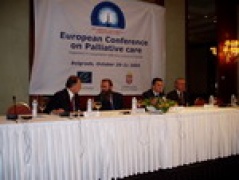Belgrade’s Hyatt Hotel was today the venue for the opening of the two-day European Conference on Palliative Care, held under the slogan “Less suffering, more dignity… a better quality of life,” and organised by the Ministry of Health of the Government of the Republic of Serbia and the Council of Europe.
Belgrade’s Hyatt Hotel was today the venue for the opening of the two-day European Conference on Palliative Care, held under the slogan “Less suffering, more dignity… a better quality of life,” and organised by the Ministry of Health of the Government of the Republic of Serbia and the Council of Europe.
In his welcome address, the Chairman of the National Assembly of the Republic of Serbia, Predrag Markovic, said that the work he was doing as National Assembly Chairman was accelerating legislative activity to define the framework for palliative care. “First we must pass legislation that establishes the state. There are two avenues of approach in Serbia, both used at the same time: on the one hand, the state is being established in accordance with European standards, and, on the other, Serbia is striving to recognise a long list of hitherto virtually unrecognised problems, to set up a network, to fund it, and to guarantee things to members of the public and back that with its authority”, Mr Markovic underlined. He added that, while Serbia was solving large issues, it also had to recognise a long list of issues that have hitherto been marginalised. “Unfortunately, Serbia and Montenegro are a society where values have exchanged places. Serbia’s people, as surveys show, have a lot of self-confidence, but very little self-respect. Self-confidence stems from ignorance and boorishness. We have to strive for our people to feel self-respect”, Mr Markovic concluded.
The issue of palliative care should be tackled by solving a number of problems; first and foremost, it has to be part of the legislative framework, after which professional health and social care services should organise the process. Referring to the issue of solidarity and humaneness in our society, Mr Markovic said: “Even more important than all that has been said is the awareness of the fact that anyone who experiences loss needs help; another important facet is the capacity to build a volunteer network that will help not only to establish palliative care, but also to raise awareness of that need to a higher level. Serbia is a society of the poor and the elderly. When palliative care is concerned, it is not important that Serbia is poor; rather, it is important to note that it is a society of the elderly and the infirm. However poor one is, one has to take care of all segments of one’s society. The health system must be made capable of forming special palliative care centres within health care institutions, as well as of forming awareness of that need”, Mr Markovic concluded.
The introductory segment of the conference also saw addresses by the Minister of Health in the Government of the Republic of Serbia, and Alexander Vladychenko, Director of the Directorate General for Social Cohesion of the Council of Europe. The conference is being held on 20 and 21 October 2005.





